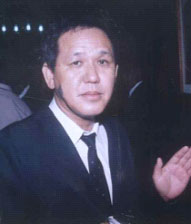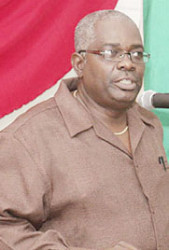Chief Election Officer Keith Lowenfield has appealed the decision of former acting Chief Justice Ian Chang to overrule his summons to have the elections petition filed by the opposition PPP/C parliamentarian Ganga Persaud struck out.
Persaud had filed a petition calling on the court to declare the entire May 11, 2015 general elections process flawed and containing many procedural errors and so many instances of fraudulent and/or suspicious actions that “the results that have been derived from the process cannot be credibly deemed to represent accurately the will of the electorate.”
He had also asked the court to order a recount of all ballots cast in the elections.

However, Lowenfield has contended that the petition has no material facts and should be struck out. In his challenge to the petition, he had asked the court to strike it out on grounds that the substantive submissions disclosed no reasonable cause of action.
As a result, Lowenfield, through his attorney Roysdale Forde, is asking the Court of Appeal to reverse or set aside the former acting chief justice’s ruling.
Among the 14 grounds for the appeal is his argument that Justice Chang erred in law when he failed to direct his mind to specific paragraphs of the petition to be struck out for being in breach of section 140 (2) of the Representation of the People’s Act.
Lowenfield also contended that the judge erred in law when he failed to direct his mind to the summons and apply the proper principles applicable to the striking out of the petition on grounds that it disclosed no reasonable cause of action and is frivolous and vexatious, embarrassing and oppressive and an abuse of the process of the court.
He further contends that the judge erred in law when he misconstrued section 42 of the National Assembly Validity of Election Act in a restrictive manner.
According to Lowenfield, the former chief justice again erred when he, notwithstanding his finding that section 42 of the National Assembly Validity of Election Act must be construed in the context of article 163 (1) and article 163 (4) (c)—which enables Parliament to make provisions with respect to the Practice and Procedure of the High Court in relation to “the jurisdiction and powers conferred upon it”—did not rule that the court had the jurisdiction to make the orders sought in the summons as it relates to the exclusive jurisdiction conferred on the High Court under article 163 (1) of the constitution.
Lowenfield advanced too, that the judge erred when he ruled that section 42 of the National Assembly Validity of Election Act, in its widest construction, would constitute an enlargement of the jurisdiction of the High Court conferred on it by article 163 (1) of the constitution.

He is also appealing what he contends is Justice Chang’s failure to find that the High Court, as stated in the National Assembly Validity of Election Act, is the same High Court established and constituted under the Constitution and the High Court Act.
Lowenfield is also contending that the judge erred when he failed to find that section 42 of the National Assembly Validity of Election Act was a specific legislative expression of the extant powers, authority and jurisdiction which was conferred on the High Court as constituted by the constitution and the High Court Act.
He further contends that the judge erred when he made a finding and determination with respect to article 163 (1) of the constitution and its relationship with section 42 of the National Assembly Validity of Election Act, without affording the appellant an opportunity of responding to the said finding.
Lowenfield is also contending that the judge erred in finding that the relief sought in the summons was excluded and prohibited by virtue of the jurisdiction conferred on the High Court by article 163 (1) of the constitution.
The High Court had been asked to rule on whether the pleadings, as revealed in the election petition, disclosed a cause of action. Justice Chang ruled that the court could not make such a determination since it might mean that he would in essence be determining the elections petition itself.
Of the ruling, Forde had said, “The decision, in my opinion, is highly flawed and it is likely that an appeal will be filed.” Counsel had thereafter signalled his intention to appeal.
To Forde’s argument that sufficient facts had not been pleaded to support the reliefs which were being claimed in the substantive petition, Persaud’s attorney Anil Nandlall had said he disagreed since the petition detailed more than 28 grounds.
Nandlall was adamant that for each ground being contested by the other side, there were sufficient facts pleaded to support them.
The opposition party’s position since the May 11, 2015 general elections is that it has been robbed of votes through a carefully planned rigging process on the part of the APNU+AFC coalition. Local and international observers have, however, declared that the polls were free and fair.




